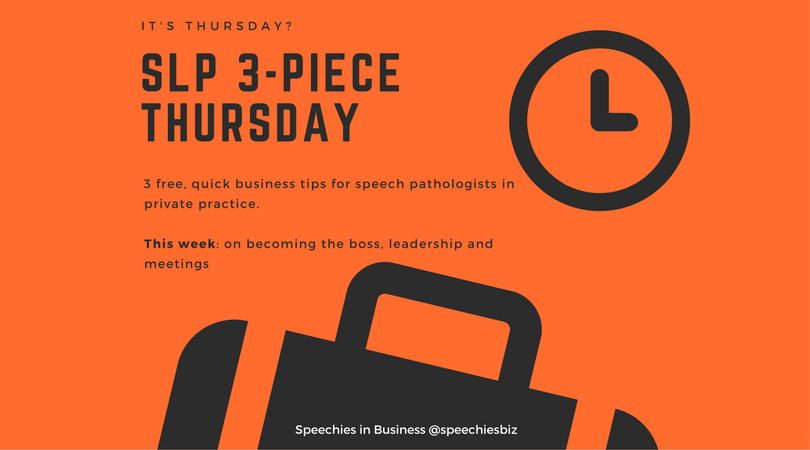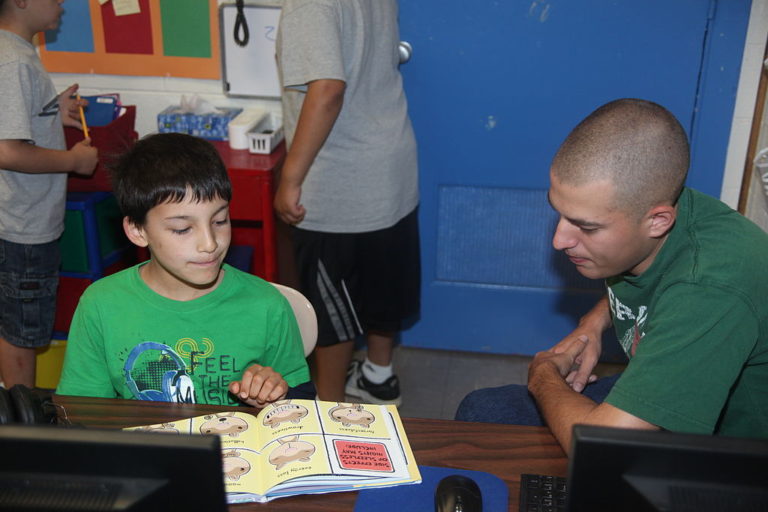SLP Three-Piece Thursday 4: on becoming the boss, leadership and meetings
- On becoming the boss: To avoid burn-out, prioritise things that matter to your business vision. Leaders need to lead themselves first, so get organised – at work and at home. Being a great SLP is not the same as being a great boss. Good bosses have empathy, and a basic knowledge of the systems used to run their business and how they work together, including computers, resources, design, social media, accounts, etc. Good bosses are visible (they don’t hide away), different to others (they have something that makes them stand out from the crowd) and consistent (especially under pressure). Communication as a boss cannot be about you: your focus should be on the team. Call staff by their names, use good, assertive non-verbal language skills, and don’t be afraid to say you don’t know or to delegate tasks outside your skills set. Avoid gossiping about staff and especially about clients. For more, check out Lindsey Pollak.
- On leadership: All organisations have leaders and followers. A leader’s first job is to make staff feel safe (including safe to make mistakes and to learn). Empathy is underrated. Think of your business as a team of people working together to achieve something meaningful, rather than an abstract organisation. Stick close to the clinical coal-face. Trust is not formed over screens, but across tables. Own up to your mistakes – no-one expects you to be perfect. As in the US Marines, real leaders eat last. Read more: Simon Sinek, Why Leaders Eat Last.
- On meetings: Meetings can be terrible: they suck up time, energy and interrupt work – especially if dominated by people who love listening to the sounds of their own voices. Calculate how much a meeting costs your practice by multiplying the total of everyone’s hourly rate by the length of the meeting. Horrifying waste! Here are some tips:
- If the meeting isn’t relevant to some staff, don’t require them to attend.
- Start meetings on time and require everyone to get there 5 minutes early. This is especially important on phone/conference calls to avoid wasting time introducing and reintroducing attendees to each other.
- Good staff meetings can increase team spirit. Hold them when people’s energy levels dip – for me, this is often around 11am or 2pm – when people need a boost.
- For small practices, have a “daily huddle” – it can take as few as 7 minutes – to run through the day, air any issues, answer questions and solve problems.
- Share positive news – meetings shouldn’t all be doom and gloom.
- Finish meetings with a call to action: e.g. “Let’s get out there and go!” (not as corny as it sounds).
- For formal meetings: (a) have an agenda; (b) appoint a chair to stick to it; (c) appoint a time-keeper to track time; and (d) appoint a “closer” to summarise action points and people responsible for executing them.
- Let juniors run meetings for experience, and encourage introverts to speak up.
- To stay focused, it might make sense to have separate business and clinical meetings.
- At least once a year, get offsite for a new perspective. For more, read Cameron Herald.
So what to do you think? Do any of these ideas inspire you to change the way you plan or run your private practice? Let us know! Send a tweet to @speechiesinbusiness or leave a comment.








